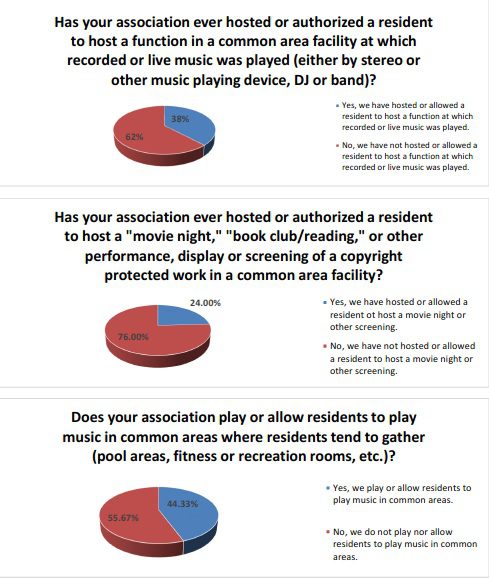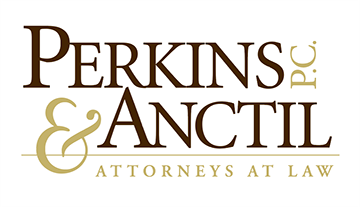We want to thank all of you who took the time to participate in our recent survey regarding copyrights and condominiums. While I had some concern that this topic may seem obscure to many of you, my fears appear to have been unfounded. We tallied the most responses that we have ever received for a single survey, with input from over one hundred participants!
What Does This Mean?
Well, it confirms that the intersection of copyright law and community association living is a subject worthy of discussion and understanding. Of our participants:
Almost forty percent (40%) indicated that their association has hosted or authorized a resident to host a function in a common area facility at which recorded or live music was played.
Just about a quarter of participants (24%) indicated that they have hosted or authorized a resident to host a “movie night,” book club/reading or other performance of copyrighted materials in common areas.
Another forty-four percent (44%) indicated that they play or allow residents to play music in common areas such as pool areas or fitness facilities.
In addition, twenty percent (20%) of respondents reported that their associations use images or artwork in their webpage or other materials without knowing whether they own the rights in such media.

Overall, these numbers are higher than what we would have anticipated and may suggest that a number of associations have unwittingly exposed themselves to potential infringement liability.
Your feedback and comments were also informative. Many respondents wrote that they only allowed individuals to play music from CDs, iPods or similar devices; however, this alone would not necessarily absolve the association from copyright infringement. Other respondents indicated that no money was charged in connection with the events, and thus, they did not anticipate any issue. Again, while the exchange of funds may be a contributing factor in an infringement finding, there can be infringement without any ticket sales, contributions or donations.
What Is Infringement Again?
To understand the potential liability facing community associations with respect to potential infringement claims, it is important to understand the protections that the Copyright Act affords to copyright owners. The Copyright Act (17 USC §104) provides that a copyright owner has five basic rights in a copyrighted work:
1. The right to reproduce the work;
2. The right to prepare derivative works;
3. The right to distribute copies or phonorecords;
4. The right to perform the work publicly; and,
5. The right to display the work publicly.
While not all of these rights are likely to be problematic in the association context, many associations inadvertently run afoul of the restrictions prohibiting unauthorized reproduction, public display and performance or even distribution of copies.
Pursuant to 17 USC §501 (a): “Anyone who violates any of the exclusive rights of the copyright owner … is an infringer of the copyright or right of the author, as the case may be.” In the case of community associations, infringement most frequently manifests itself in the form of unlicensed or unauthorized public or semi-public displays or performances of copyright protected works. The Copyright Act requires that an association have the appropriate license(s) in place for any public performance of protected works.
Penalties for infringement are significant. A copyright owner can receive either actual damages and profits, or statutory damages in the amount of up to $150,000.00.
Why Does This Matter To Me?
It may not. Of over one hundred respondents to our survey, only one replied that he had received a notice of infringement or other communication from a Performance Rights Organization (“PRO”). This is not particularly shocking. By and large it seems that PROs would not necessarily make community associations in New England their top targets for infringement claims. We suspect that restaurants, bars, hotels and other such facilities are much more likely to end up on the receiving end of a PRO demand.
However, that is not to say that community associations should not be mindful of these issues. For those associations who regularly allow or host displays or performances at their common facilities, best practice would be to obtain licenses directly from the PROs, to negotiate with performers to ensure that they have proper licenses in place, or to attempt to ensure that any displays or performances of copyright materials are otherwise covered by appropriate exceptions to infringement.
